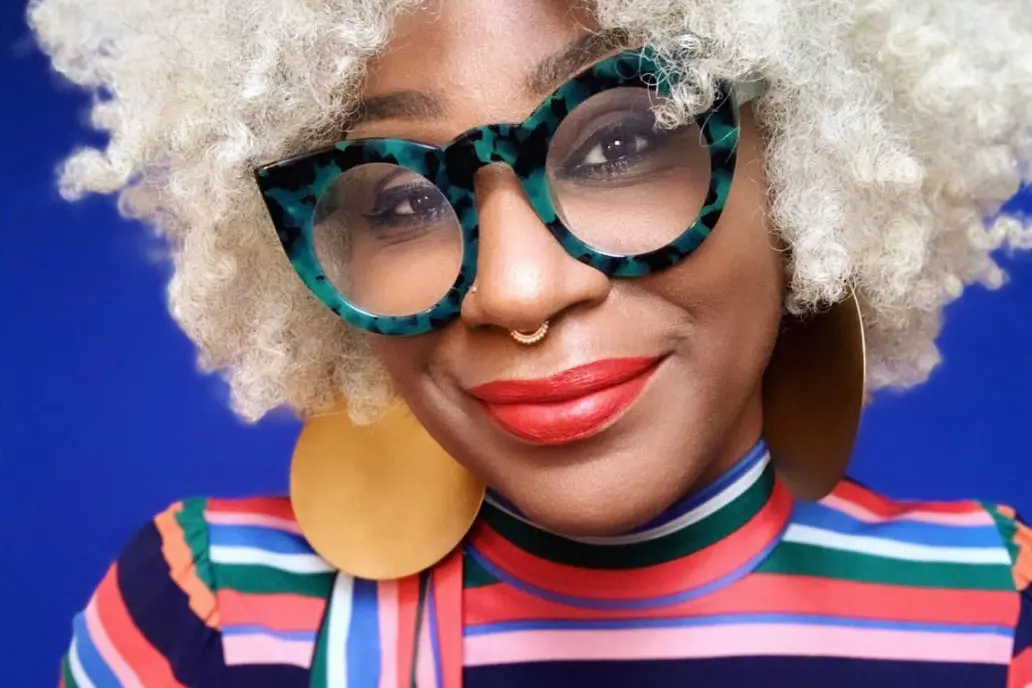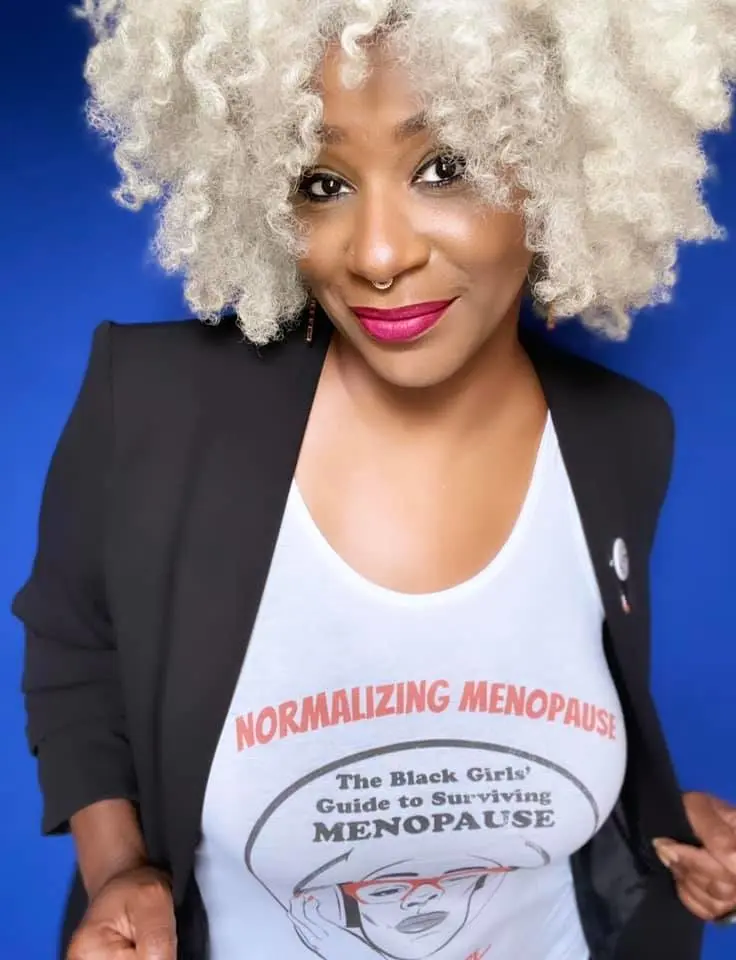
Omisade Burney-Scott is truly a supernatural force. I first became aware of her work when she hosted our Chief Medical Officer, Sharon Malone, on an Instagram live, and fell in love. (We have yet to meet in person, but the digital connection is real!) She is the creator and curator of The Black Girls’ Guide to Surviving Menopause, a multimedia project that curates the stories of Black women, women-identified and gender expansive people who are perimenopausal, menopausal or post-menopausal.
She is a 7th generation Black Southern feminist, creative and social justice advocate. Her work is grounded in social justice movement spaces focused on the liberation of marginalized people, beginning with her own community. This commitment to liberation has manifested through advocacy work, philanthropy, community organizing and culture work.
And there is so much work to be done! According to the Study of Women's Health Across the Nation (SWAN), Black women suffer the most severe menopause symptoms for the longest amount of time, and are the least likely to be offered solutions by their doctors. Omisade uses the medium of storytelling to disrupt the erasure of Black women's voices as they age, through sharing their first-person narratives and lived experiences. It was a pleasure to speak with her and ask her to share her own story.
Anne: I’m so glad to be able to speak with you, Omisade. I love how in your work, you combine the health and the science with a profound ability to connect with people. I love the storytelling and the mystical and magical pieces of your work as well. I’d love to hear how you got started with storytelling.
Omisade: I met with two very good friends, one person who is my podcast producer, and said, "I think I want to do some audio with some storytelling with black women around aging and menopause and sex and grief and rage and partners and children." And Mariah, my podcast producer, said, "You should call it the ‘Black Girl's Guide to Surviving Menopause.’"I had no idea how to do a podcast.
Anne: I love that you wanted to talk life and grief and sex and rage. It's such a holistic understanding of what menopause is. t's not like, "Here's how to solve a hot flash." It encompasses everything. It allows all this creativity and artwork to spring forth together. How do you think that happens?
Omisade: I think it's a very energetic exchange. I try my best to help people feel safe and remind them that "You're the expert of your story.” You get to share with me what you want to share. I'm not going to do a gotcha and ask you a question I feel like is going to knock you off your seat. Now, if you start to go deeper, I'll go with you — and we can keep going as deep as you would like to go. But I'm very clear that I don't want to do gotchas. I'm not a therapist. I don't want to crack someone open and not have the ability to support them. That feels very irresponsible.
Anne: Creating that safe space is so important — and it’s beautiful the way you're doing it. Twenty years ago there was a study that created an atmosphere of fear about some of the solutions out there. It created a situation where women began making a lot of decisions based on fear and not facts.
Omisade: From a consumer standpoint, from a citizen standpoint, from a patient standpoint, ultimately what I want when I sit my butt on that piece of paper in my doctor's office, what I want is for my doctor to remember first that they're talking to Omi. They're not talking to a data point. You're talking to me, your patient. If I present to you and say, "I'm having these intensely challenging symptoms," then I want you to support me and tell me what all my options are.
I think generally speaking, the way that most women experience medicine is hit or miss. That’s the baseline. And then when you start factoring in race, ethnicity, class, background, it gets even more tricky. We know that when people use the language of health disparities, what they're talking about is racism. I don't use the phrase “health disparities.” I talk about how White supremacy kills Black people inside of medical practices. It's a real thing.
I know my own body. I might not be able to do a diagnosis, but I know if something's hurt or if something's not right. I can tell you. What we want is for our physician look at us and say, "I believe you, and what we're going to do is work together to figure out what this is, okay?" I know that is a privilege to be able to sit across from doctors who believe me when I tell them that something's not right.
Anne: It is really powerful when you talk about the lack of research and knowledge, that there's just so much more to learn.
Omisade: I think that with menopause, we require a bridging of the anecdote and the data too. Some data poets need to rise to the surface who are like, "Here's what the data says. Let's wrap this in information in a story anecdote that resonates."
There's a place of growth for us. We don't have menopausal midwives. We have midwives and doulas for people who are potentially going to have a baby or are postpartum. There's all of this mother wisdom that lives inside of us around that is ancient, centuries and centuries, millennial old, around the business of birthing. The business of bringing another human being into the world.
Somehow, we got cut off from that relationship with the natural world as it relates to menopause. There's no way that our great grandmothers and great-great-grandmothers and great-great-great grandmothers were going through menopause and weren’t doing anything. There wasn't a tea or a berry or a rock that they could take? That can't be true.

Anne: I love the idea of menopause midwifery.
Omisade: I'm so here for some menopause midwifery. I'm a full-spectrum doula. I have helped people prenatal, postpartum, people who were accessing abortion care, miscarriage and death. So what happens when we get to peri-menopause, we just fall off?
Anne: Do you think it's because we didn't used to live this long?
Omisade: There’s also a very Westernized understanding. We are situated in the United States, which is a very young country in relation to other places in the world. I think if we looked to antiquity in other countries, we’d find wisdom there. I'm sure grandma had all kinds of teachers to help her with hot flashes.
Anne: What do you like about being your age?
Omisade: Oh my goodness. So much of my life I was, and still to some degree, intensely moving in a way to be accepted, whether by my peer group, my parents, my culture, my community, my classmates. I wanted to be witty. I wanted to be attractive. I wanted to be smart. I wanted to be a leader. I wanted all these things. I started constructing very intense performative masks. It was really intense.
Anne: Do you feel as you've gotten older, you've just abandoned them or are they slowly peeling off?
Omisade: I think they started to crack under the pressure. I also think that my relationship and journey with depression and anxiety offered me an opportunity to take some of them off.
Anne: That’s a really nice way of saying that.
Omisade: I'm grateful that I have been on this journey, especially with a really good therapist who, when I can feel another mask about to come off, he's like, "Okay, which one is this one?" And then we watch this thing not just fall away, but plunk. And then I just step over it.
Oftentimes in my more intimate relationships it was like, "If I take this mask off and you really see me, are you going to be like, 'Well, that's not attractive at all. That is not what I agreed to. I'm leaving now’?" And as opposed to, "Well, look at you. Aren't you just lovable any old way you are?"
I think I'm trying to invite that in my 50s, certainly in my intimate relationship with my girlfriends. I'm so blessed to have amazing girlfriends who I can just let it all hang out with. And I'm so grateful. I can say the scary things to them and they don't look at me like, "Girl, I'm not sure what's going on with you." They go.
Anne: It's beautiful. And this at this age, at this moment of transition or midlife crisis, or pivot, or reset, not everyone has a community around them for that.
Omisade: I'm sure that y'all experience this with Alloy. I know I experience it with Black Girl's Guide. I have people reaching out to me who are like, "I feel completely isolated. I feel like I don't know what's going on." I always try to frame it. Whenever a person reaches out to me who I don't know, I always try to be very, very careful and say, "Listen, I really appreciate you sharing your story with me. That feels really important and I really respect that. I want you to be very clear about the things that I don't do or cannot do, right?"
I tell them: “I'm not a therapist. I'm not a doctor. I'm not, if I could go back in time, I would become a nurse practitioner in a hot minute, but I'm not a nurse practitioner. So you're talking to somebody who's like you, on her own journey. What I can offer you is perspective. And resources that I have come in contact with that I think are kind of universally helpful. But I don't want you to think that our talk is going to fix it for you because I'm still trying to fix my stuff too.”
Anne: Going on that search for the storytelling is really powerful and I'm grateful to you for sharing this. We don't really have a culture here in the U.S. that centers on the wise old woman.
Omisade: We got detached from that in some ways. I do think inside of Black culture there is the big Momma, Madea grandmother, matriarch energy. But I think she lives inside of a very tight construct of what people feel should be her role or what's appropriate for her. So, Big Momma's probably not having sex. Big momma loves Jesus and her grandkids.
Anne: I know this trope.
Omisade: It's caricature, right? And so sometimes when people say, "Well, they don't make women like Big Momma anymore," I say, "You know, we don't know if Big Momma actually liked being Big Momma." If you and I were able to have wine right now with our moms, I'd be curious about what they would say. Things like, "I can't believe y'all are having these conversations about menopause."
This interview has been edited for clarity, brevity and flow.
Subscribe
Go ahead, you deserve to